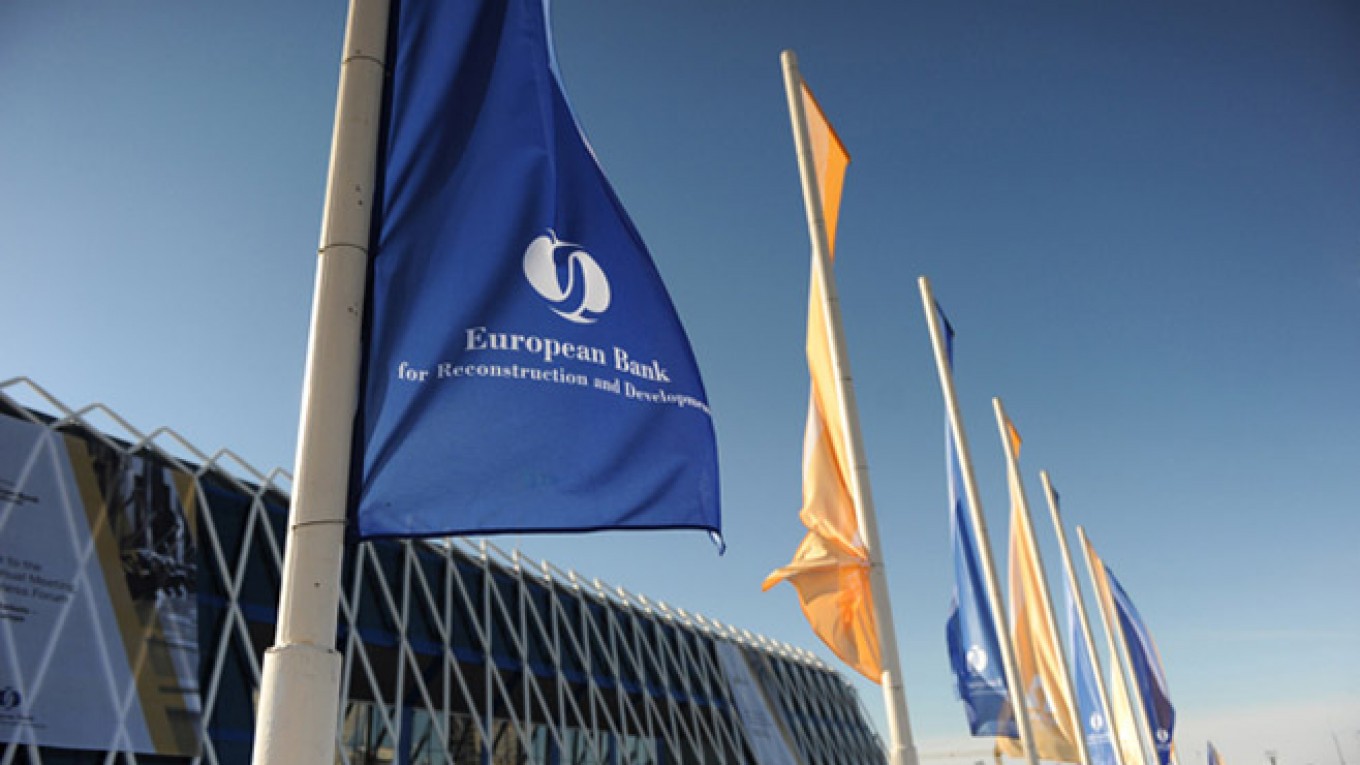The European Bank of Reconstruction and Development, or EBRD, on Wednesday froze financing of new projects in Russia amid escalating international condemnation of Russia's alleged role in the downing of a passenger jet in eastern Ukraine.
"A majority of the board of directors of the EBRD, including all European Union member states and several non-EU shareholders, have given clear guidance to the EBRD management that, for the time being, they will be unable to approve new investment projects in the Russian Federation," the organization said in a statement Wednesday.
The London-based development bank will continue work on its 305 active projects in Russia, where its operating portfolio amounts to 8.4 billion euros ($11 billion).
While the loss of new EBRD investments is far from trivial — about 19 percent of its investments, or nearly $1 billion, went to Russia in the first half of this year — the decision suggests that worse may be on the horizon, analysts said.
"It is a harbinger of what is going to happen, which is the increasing capital isolation of Russia," said Fredrik Erixon, director of the European Center for International Political Economy.
International lenders have shut their doors on Russian banks and companies in recent months for fear of further sanctions from the West over Russia's policy in Ukraine, leaving Russian banks unable to access additional financing and meet the needs of the national economy.
"Given the high capital need and the high investment need in the Russian economy, [capital isolation] is going to have a very, very strong effect on national GDP," Erixon said.
The EBRD's decision shows that the doors have only shut tighter since the downing of Malaysia Airlines Flight MH17 last week, which the U.S. and others have blamed on Russia's alleged funneling of weapons to the pro-Russia separatist rebels in Ukraine's east.
The deaths of the 298 people on board, many of them EU citizens, has put the EU under pressure from the U.S. and member states such as Britain to ratchet up sanctions to so-called "stage three" sector-wide measures.
In this sense, the actions of the EBRD, whose shareholders include the EU, all 28 EU members states and the European Investment Bank, reflect the EU's wider policy.
"It is the EU sending a message that Russia is currently not a good place to put your money, and that is a message that I guess the private sector will pay attention to," said Ian Bond, director of foreign policy at the London-based think tank Center for European Reform.
But at the same time, just like existing EU sanctions, freezing EBRD funding is a way to send a message without inflicting significant damage to either the Russian or EU economies. The EU's ties to Russia are significant: The 28-state bloc imported 206 billion euros ($277 billion) of Russian goods and exported 120 billion euros ($161 billion) to Russia last year, according to the European Commission.
On Tuesday, EU foreign ministers raised the possibility of industry-wide sanctions, but concrete economic measures against Russia still remain elusive.
"There is still this sense from a number of EU countries that we are not going to move to stage three [sector-wide sanctions] unless Russia does something really bad. And I am starting to wonder, just what would that be?" Bond said.
In the short term, the loss of EBRD funding alone will be marginal in terms of economic growth, according to Alexander Morozov, chief economist for HSBC.
If the bank were to freeze all projects in Russia, which it does not intend to do, then based on an approximate yearly investment in recent years of 2 billion euros ($2.7 billion), the loss of EBRD's investment could shave about 0.1 percent off Russia's GDP, he said.
"If we are speaking just about freezing new projects, then it will still be 0.1 percent of GDP, but only if [the freeze on funding] continues for several years," Morozov said.
The EBRD board's decision also turns the spotlight on other multilateral institutions, such as the International Monetary Fund, or IMF, and the World Bank. The World Bank in particular raised hackles in June when its private-sector branch approved a 250 million euro ($340 million) loan to fund French food retailer Groupe Auchan's expansion in Russia.
But with the strong EU presence among its shareholders, the decision of the EBRD's board is more reflective of EU policy than of the stance of other development banks, Erixon said.
Bond agreed: While the EBRD has commitments to the EU, "the IMF and the World Bank have always tried to avoid taking economic decision on political grounds," he said.
But there is a gray zone, he added. "There is always a margin of appreciation, that is, when does a negative political situation actually become a threat to the economy of the country concerned?"
See also:
Draft EU Plan Seeks to Block Loans to Russia Through EBRD and EIB
Contact the author at d.damora@imedia.ru


